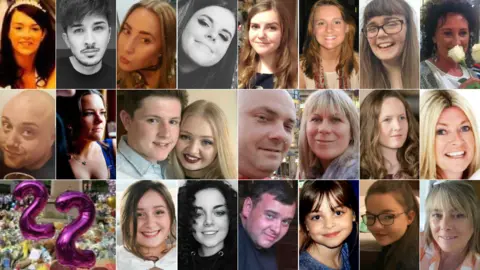Manchester Arena Inquiry: Families' lawyers make bid to question MI5
 Family handouts
Family handoutsThe security services made "grave breaches of their duty" in failing to stop the Manchester Arena bomber and should face questions from the bereaved families, the attack inquiry has heard.
Salman Abedi, 22, killed 22 people when he detonated a device on 22 May 2017.
Fourteen witnesses are due to appear at closed Manchester Arena Inquiry hearings about MI5 and counter-terrorism police's conduct.
Lawyers for the bereaved families want the chance to question the witnesses.
The upcoming sessions will examine the conduct of the security services before the attack and consider what they knew about Abedi.
They will not be held in public in the interests of protecting national security.
The inquiry has previously been told that intelligence services were aware of Abedi as far back as 2010 and MI5 has already admitted there were missed opportunities to investigate him more closely in the months before the bombing.
'Inadvertent disclosure'
John Cooper QC, who represents 11 of the families told the hearing that the security services had already admitted to "what some might consider... grave breaches of their duty in both following and apprehending Salman Abedi and others and indeed in due course taking significant steps to preventing the atrocity".
He said those admissions were as "staggering as they are limited".
Mr Cooper said the bomber was "clearly known to security services" in July 2014, but "whether or not he was a person of interest and to what level he was a person of interest is still opaque".
As such, he said, it would be unfair if lawyers for MI5 and counter-terrorism police were allowed to be at the closed hearings but lawyers for the bereaved families were not.
He added that if the families and their lawyers were prevented from attending the hearings, a team of "special advocates" should be appointed to represent them.
Cathryn McGahey QC, who represents the Home Office and MI5, said the government was opposed to such access because the risk of "inadvertent disclosure" was "simply too great".
Lead counsel to the inquiry, Paul Greaney QC told the hearing that it would be unlawful to allow the families to be at the hearings or to give their lawyers limited access to restricted material.
He also said the inquiry legal team believed the use of "special advocates" was unjustified.
Inquiry chairman Sir John Saunders said he wanted "the families to know as much as they can", but stressed he was "governed by the law and I must not act unlawfully."
He is expected to make a judgement on the request in the coming days.
The inquiry continues.

Why not follow BBC North West on Facebook, Twitter and Instagram? You can also send story ideas to [email protected]
